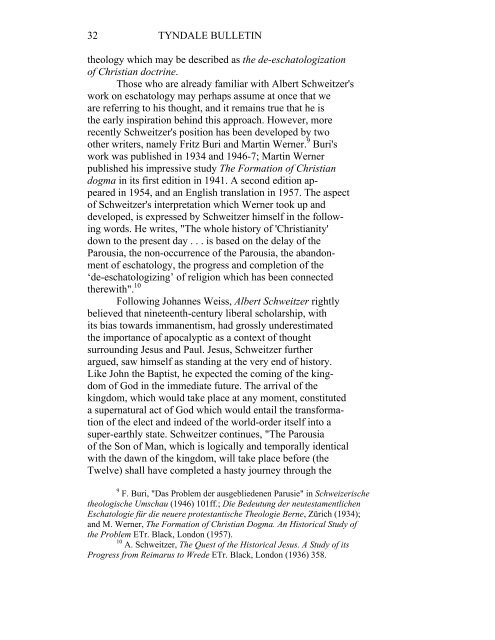the parousia in modern theology: some questions ... - Tyndale House
the parousia in modern theology: some questions ... - Tyndale House
the parousia in modern theology: some questions ... - Tyndale House
Create successful ePaper yourself
Turn your PDF publications into a flip-book with our unique Google optimized e-Paper software.
32 TYNDALE BULLETIN<br />
<strong>the</strong>ology which may be described as <strong>the</strong> de-eschatologization<br />
of Christian doctr<strong>in</strong>e.<br />
Those who are already familiar with Albert Schweitzer's<br />
work on eschatology may perhaps assume at once that we<br />
are referr<strong>in</strong>g to his thought, and it rema<strong>in</strong>s true that he is<br />
<strong>the</strong> early <strong>in</strong>spiration beh<strong>in</strong>d this approach. However, more<br />
recently Schweitzer's position has been developed by two<br />
o<strong>the</strong>r writers, namely Fritz Buri and Mart<strong>in</strong> Werner. 9 Buri's<br />
work was published <strong>in</strong> 1934 and 1946-7; Mart<strong>in</strong> Werner<br />
published his impressive study The Formation of Christian<br />
dogma <strong>in</strong> its first edition <strong>in</strong> 1941. A second edition ap-<br />
peared <strong>in</strong> 1954, and an English translation <strong>in</strong> 1957. The aspect<br />
of Schweitzer's <strong>in</strong>terpretation which Werner took up and<br />
developed, is expressed by Schweitzer himself <strong>in</strong> <strong>the</strong> follow-<br />
<strong>in</strong>g words. He writes, "The whole history of 'Christianity'<br />
down to <strong>the</strong> present day . . . is based on <strong>the</strong> delay of <strong>the</strong><br />
Parousia, <strong>the</strong> non-occurrence of <strong>the</strong> Parousia, <strong>the</strong> abandon-<br />
ment of eschatology, <strong>the</strong> progress and completion of <strong>the</strong><br />
‘de-eschatologiz<strong>in</strong>g’ of religion which has been connected<br />
<strong>the</strong>rewith". 10<br />
Follow<strong>in</strong>g Johannes Weiss, Albert Schweitzer rightly<br />
believed that n<strong>in</strong>eteenth-century liberal scholarship, with<br />
its bias towards immanentism, had grossly underestimated<br />
<strong>the</strong> importance of apocalyptic as a context of thought<br />
surround<strong>in</strong>g Jesus and Paul. Jesus, Schweitzer fur<strong>the</strong>r<br />
argued, saw himself as stand<strong>in</strong>g at <strong>the</strong> very end of history.<br />
Like John <strong>the</strong> Baptist, he expected <strong>the</strong> com<strong>in</strong>g of <strong>the</strong> k<strong>in</strong>g-<br />
dom of God <strong>in</strong> <strong>the</strong> immediate future. The arrival of <strong>the</strong><br />
k<strong>in</strong>gdom, which would take place at any moment, constituted<br />
a supernatural act of God which would entail <strong>the</strong> transforma-<br />
tion of <strong>the</strong> elect and <strong>in</strong>deed of <strong>the</strong> world-order itself <strong>in</strong>to a<br />
super-earthly state. Schweitzer cont<strong>in</strong>ues, "The Parousia<br />
of <strong>the</strong> Son of Man, which is logically and temporally identical<br />
with <strong>the</strong> dawn of <strong>the</strong> k<strong>in</strong>gdom, will take place before (<strong>the</strong><br />
Twelve) shall have completed a hasty journey through <strong>the</strong><br />
9 F. Buri, "Das Problem der ausgebliedenen Parusie" <strong>in</strong> Schweizerische<br />
<strong>the</strong>ologische Umschau (1946) 101ff.; Die Bedeutung der neutestamentlichen<br />
Eschatologie für die neuere protestantische Theologie Berne, Zürich (1934);<br />
and M. Werner, The Formation of Christian Dogma. An Historical Study of<br />
<strong>the</strong> Problem ETr. Black, London (1957).<br />
10 A. Schweitzer, The Quest of <strong>the</strong> Historical Jesus. A Study of its<br />
Progress from Reimarus to Wrede ETr. Black, London (1936) 358.

















